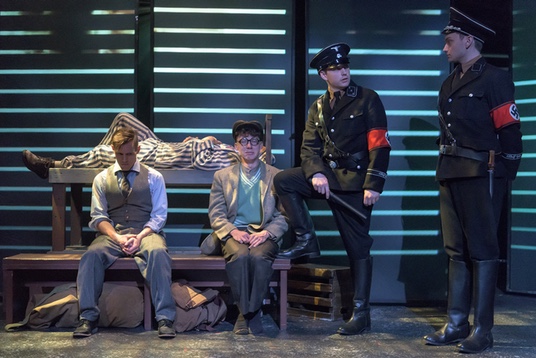Though Sun 7/1
What would you do to survive? Bent, a 1979 drama by Martin Sherman, ruminates on this question and others in this Beck Center production. The title does not mean it’s a satire of Rent (as I had hoped), but that it touches on social norms and what is considered “straight” and what is considered “bent.”
The tight confines of the Studio Theatre make it hard to avoid the story’s harsh truths. And that is clearly what director Matthew Wright intends.
We know nothing good is going to happen when we realize that Bent is set in Berlin, summer 1934, a time when Hitler was busy consolidating his power and murdering his opponents. It’s often known as the Night of the Long Knives, but it lasted much longer than one night. This play concerns what happened to men who were identified as gay and shows their persecution. Along with Jews, gypsies, and others, they had to wear a badge to signify their identity. Pink meant “gay.”
We first meet the debonair gay Max (Geoff Knox) and his boyfriend, fragile dancer Rudy (Antonio Dejesus), in Max’s apartment where they have just awoken after a night out clubbing and drinking. At this point, no one wears a badge. Wolf (Nate Homolka), a Nazi stormtrooper Max picked up, wanders in half-dressed and totally confident of his charm. Violence erupts shortly after and Max and Rudy flee to the club where drag queen Greta (Brian Altman) fills the two (and us) in about how bad the situation is; their problem is little compared to epic levels of murder taking place around Germany. Max and Rudy end up arrested and put on a train to Dachau where bad things continue to happen.
After that brutal hour-long first act I thought the play was over, “How could things get worse?” I naively asked. I found out during the second act when Max (pretending he is Jewish, not gay, because he thinks guards will go easier on him) and the admittedly gay Horst (Andrew Gorell), now in Dachau concentration camp, live out pointless acts of subjugation doing pointless tasks. (Maybe 10 minutes less of rock carries and “Yes, sirs” would have worked just as well, but Sherman certainly made his point namely, that there was no point in what happened in prison).
But there was a romantic ending — of a sort. Love, something Max has avoided in favor of survival, comes to him in the camp. There’s a final, desperate act of redemption that we are set up for early in the second act. (There’s also a vivid three-minute sex scene that involves no physical contact between Max and Horst.)
Gorell and Knox, both fine actors, hold the play together and offer a persuasive answer to one question that the playwright seems to be asking: “Is life worth living if you have to kill those you love?” In a play that is certainly “political” today, they and their castmates bring out the idea that the political is always personal, and that survival alone is poor compensation if love is denied or ignored.
Other members of the ensemble included David Bugher (as kindly, closeted Uncle Freddy and as the brutal captain) and Luke Ehlert (as a brutal guard). Note many brutal parts in this play.
The set, designed by Aaron Benson, featured cloth panels that shifted with each scene. Scene changes were snappy, if disconcerting (especially when a dead man got up and moved furniture), but helped keep a sense of action going. Overall, things went well, but I have a preference for the Studio Theater anyway — up close and personal.
BOTTOM LINE: A somber look at how cruel humans can be to each other. Everyone seemed a bit down afterwards, but we certainly had plenty to ponder.
[Written by Laura Kennelly]
